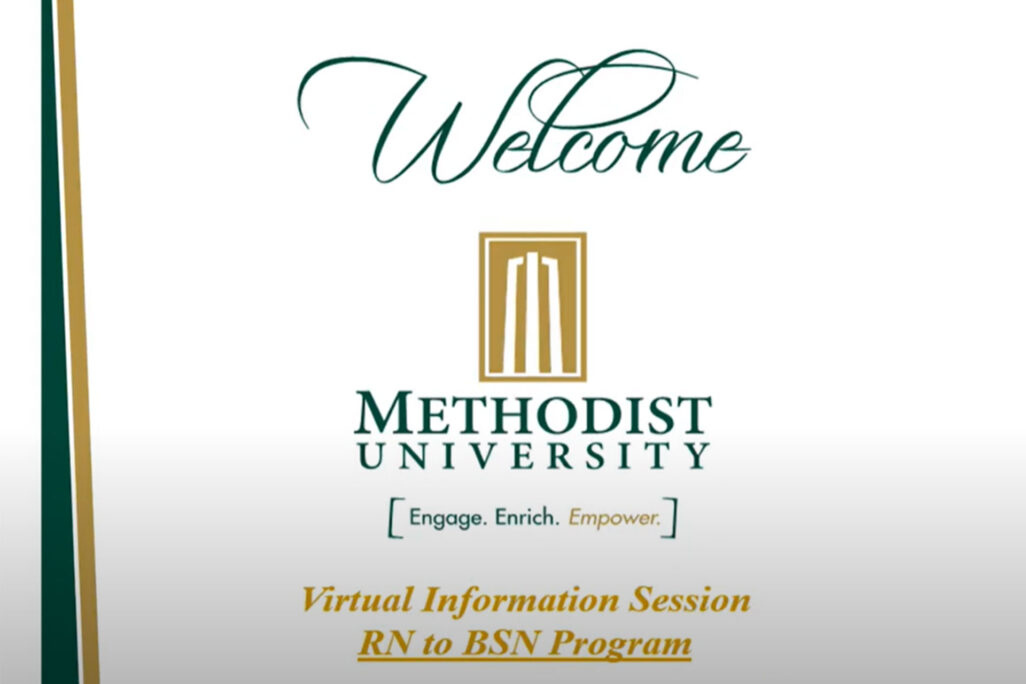Online RN to BSN

Explore Flexible Pathways with MU’s Accredited RN to BSN Degree Online
CCNE- Accredited
Focused Clinicals
Affordable Tuition
Request More Information
If you’d like to learn more about Methodist University’s application process, admissions requirements, tuition and financial aid or specific program details, fill out this form, and we’ll be in touch shortly.
- Duration 1-2 years
- Cost per Credit $435
- Credit Hours 124
Program Benefits
- Convenient Online Format
- Learn from Seasoned Health Care Practitioners
- Help with Clinical Placement
- Eight-Week Terms
Expand Your Knowledge and Patient Care Skills
Advance your education and career with Methodist University’s online RN to BSN (Registered Nurse to Bachelor of Science in Nursing) program.
Expand your knowledge with coursework covering professional practice, leadership, research, health policy, evidence-based practice, pathophysiology, public health, and an engaging capstone. A required elective course gives you the flexibility to further explore the areas of gerontology, women’s health, or critical care.
According to an American Association of Colleges of Nurses (AACN) position statement, the growing challenges and complexities in health care require nurses to have an education that addresses these responsibilities. The AACN recognizes the BSN as the minimum educational requirement for professional nursing practice.
You can complete the Methodist University program in as little as one year to quickly advance your career.
Pursuing my RN-BSN online with Methodist University was an educational experience unlike any other. The flexibility of this program is fantastic! It allowed me to complete my assignments while continuing to work full-time. My MU courses really helped me develop a more professional mindset, and the confidence to be a leader. Each professor, without fail, wants every student to succeed and is keenly interested in the learning styles of their students.
–Ann Snyder
Class of 2023, RN-BSN

Dickey, Allison
Hello everyone and welcome to Methodist University’s virtual information session for our online undergrad nursing program.
We’re very excited to offer you this session, to learn more and provide a better understanding of the online programs and our amazing team.
My name is Allison Dickey, Director of Enrollment, and I will allow our faculty members to introduce themselves.
Shannon Matthews
Hi, I am Shannon Matthews.
I’m the Director of Nursing Programs here at Methodist.
I’ve been in nursing for about 30 years in an education in the last 20 of those I’ve been at Methodist for over a decade, and we really are excited to have you with us today.
Lori Cooke
And I’m Doctor Laurie Cook.
I’m also a full-time faculty here at Methodist University. I teach currently in the traditional undergrad and the RN to BSN program.
I’ve been a nurse for over 33 years.
I’ve been in education for over 10 years and I’m really excited to be here with all of you today.
Dickey, Allison
Thank you both for kicking us off.
I’ll walk us through the RN to BSN degree completion.
We have a program length of 124 total credit hours that includes 31 core credit hours.
Now I’d like to point out that the number of credit hours you might need will be based on your qualified transferable credits.
All the more reason to speak with a qualified Enrollment Counselor to talk more about the specifics.
We do offer a maximum of 93 credit hours.
We can transfer those in, and we can transfer up to 64 credit hours from an eligible Community College.
Now the RN to BSN completion program, students will be granted a block of 38 credit hours towards the 124-credit hour university graduation requirement.
After the successful completion of RNU 3000 and providing evidence of a current and unencumbered RN license, the cost is $435 per credit hour.
Now, tuition for active-duty military, National Guard, and reserve component students have a discounted price of $250 per credit hour for the undergrad program.
I’d like to also point out that 97% of our students do receive financial aid.
The requirements we do need are a completed application, a current unencumbered RN license and an associate degree in nursing, an associate of science in nursing, or a nurse diploma from an NLNAC ACEN or a regionally accredited program.
We do need transcripts and a minimum GPA of 2.0.
Now, Doctor Matthews, if you could walk us through the curriculum and how these core courses really set us apart?
Shannon Matthews
OK. Thank you.
Our curriculum is designed to be completed in an 8-week term offered 6 times a year.
It was created to be completed in three semesters and that’s taking 12 credit hours each semester, so that’s a pretty heavy load.
But we have this in mind for our working nurses.
So you do have the option to slow that down and so far, most of our students have decided to take one course per term instead of two.
And that has just been a pace that works well for everybody.
But we do have flexibility and we don’t have a lot of prerequisite complications.
So you have the option to slow down and speed up based on what your schedule allows and what courses are offered.
A couple of courses that you may be interested in hearing about,
one is the Wicked Health Policy, and that title is a little unique.
It’s called Wicked Health Policy because it just means health policy is complicated and challenging.
And so, it really tries to lay out some of the key policies that we have, impact that influences us as nurses and how we can influence community health and public health nursing.
That’s another course that is really interesting.
Again, that’s designed to really look at the population’s health and things that are going on in your community.
It has a clinical component and with that you will do a community assessment.
You will identify a problem in your community population and come up with some interventions.
Then you develop a really nice poster presentation for that course.
So you have nice tangible things that you can use to show how you can have a strong impact in your community.
Doctor Cook developed the nursing practice Capstone and teaches that course.
I’m going to let her tell you about that one.
Lori Cooke
Alright, thank you very much.
So the capstone course is exactly what it sounds like.
This is the culmination of your experience.
While with us here at Methodist University, we want you to spend some time reflecting on how your professional nursing practice has changed or evolved since you’ve been here.
We also want to help you prepare for the next step.
We know that you are taking your BSN or obtaining your BSN with something in mind, whether that be graduate school, a management program, or a change in workplace environment.
So we’re going to help you prepare for that by helping you draft a resume and cover letter throughout the program. You will build a portfolio with examples from the program in the different courses you have taken throughout. And so we’re going to put that together and make sure that it’s ready to go upon graduation.
In addition, this has a clinical component, you will choose an area that you are interested in and do some shadowing and fellowship-type hours in that piece.
What’s nice about this is how these courses, both the community and the capstone, were designed. You can take the didactic and the clinical piece together, or you can take them one after the other.
And that’s really going to depend again on your lifestyle and your working hours and really what fits best for you.
And then again, you’ll work on a project for a final presentation that reflects what you’ve learned to these final clinical hours. It’s been a really good experience for our students, and they’ve really enjoyed these so far.
Thank you.
Dickey, Allison
Absolutely. Thank you both.
Now the program benefits for the RN to BSN coursework is flexible and in a 100% online format.
We have eight-week courses, 6 terms in a year, full-time and part-time.
Transferring is available up to 93 transfer credits will be accepted from RN to BSN.
Students will be granted a block of 38 credit hours, and again, the clinical and capstone elements of the program.
Doctor Matthews, if you could walk us through the program outcomes?
Shannon Matthews
Sure, this program was really a collaborative effort for the faculty and really it’s designed to help you achieve your academic and career goals.
So we want to really foster collaboration with members of the healthcare team with the patient-centered focus evidence-based practice, which are already using just really help you realize that and be more consumers of evidence.
So you’re evaluating research articles and journal articles and best practices and really thinking about the reason that we’re doing things culturally, compassionate care is something we really strive for.
And that, you’ll see that threaded throughout the curriculum.
So we really want to just help you get to your career goals, whether it be just a, you know, an advancement in your current practice, maybe changing lanes altogether.
But by getting your degree completion to your BSN, just gives you a stepping stone to getting your master’s degree or a DNP.
So it’s a really good program and it has a lot of flexibility in helping move forward in your professional goals.
Dickey, Allison
Thank you, Doctor Matthews, and our financial assistance page.
A gentle reminder, 97% of our students again receive financial aid.
Our financial aid FAFSA link is right up at the top with our school code just below.
We do offer various types of scholarships and grants, including merit-based and need-based, talent-based that are offered by businesses, civic groups, foundations, churches and more.
We also have a $2000 scholarship for RN to BSN students with an associate degree from a North Carolina Community College and we have a very strong military population.
We are a Yellow-Ribbon School.
We are Military Gold Friendly and we were voted Best for Vets.
We support the GI bill.
Tons of different scholarship opportunities for that military population.
And again, with the $250 credit hour cost for our tuition after the active-duty National Guard and Reserve component military students now partnerships you could be eligible for a 10% tuition reduction.
We work with select organizations to make sure that you can advance your education, and your career in an affordable, timely manner.
We have a 10% discount on tuition for Cape Fear Valley Medical Center and First Health employees and their immediate family members through the Chamber of Commerce.
If you’d also like to just pick up the phone and start asking some questions that are more directly impacting you and your family, give us a call.
Our phone number is right at the bottom of the screen.
Now, if you are ready to apply, you can use this link here and start filling out your application.
Someone will be in touch with you if you just need to soundboard with an Enrollment Counselor who knows the program. The specific benefits and just to really soundboard your specific situation, request more information.
We can collaborate with you via text, email, or phone call.
Whatever works best for you.
And our contact information at the top, we have our online admissions contact information.
We also have Doctor Tina Miller listed.
She is the Director of Online and Transfer Student Support.
Her email and phone number are listed below.
The wonderful Doctor Shannon Matthews, Director of the Nursing Programs, email and phone number listed below, and Jennifer Caviness, Admissions Coordinator and Academic Advisor.
Email and phone number are listed below.
We want to thank you for joining us today.
If you have any questions at all, please do not hesitate to reach out, and thank you for your time today.
Watch our RN to BSN Information Session
Hear from our MU faculty and learn more about our RN to BSN program.
Career Outlook: Join an Expanding Field
The American Association of Colleges of Nurses (AACN) has identified the BSN degree as the minimum educational requirement to practice nursing, and nurses graduating with a BSN are in high demand across practically all health care settings. According to the Bureau of Labor Statistics, registered nurse (RN) positions are expected to grow by 5% through 2034.1
Careers and Salaries
Curriculum: Build a Foundation in Patient Care
With a total of ten core degree courses, MU’s online RN to BSN curriculum explores topics that include evidence-based nursing practice, health policy, nursing leadership, and public health. As a student, you will be able to choose your plan of study with an elective course as well.
The RN to BSN program at Methodist University is accredited by the Commission on Collegiate Nursing Education (http://www.ccneaccreditation.org).
Preview CoursesProgram Outcomes
- Collaborate with other health care professionals to offer effective, patient-centered care.
- Offer evidence-based nursing care across an array of health care settings.
- Apply nursing informatics and innovative medical technology to promote safe, effective care.
- Embrace compassionate, culturally competent nursing practice to support positive health outcomes.
- Identify and evaluate the safety and effectiveness of healthcare policies and procedures.
Minors
Enhance your degree by adding one of MU’s eight available 100% online minors — Accounting, Business Administration, Computer Information Technology, Criminal Justice, Gerontology, Marketing, Psychology, and Social Work. Our minors are structured to help you advance in the career path you want most and impress potential employers with your dedication to learning.
To learn more about MU’s minors and how you can add one to your degree, visit our minors webpage. You can also request more information about a minor or contact an enrollment counselor directly at 910.212.4956.
Explore MinorsAdmissions Requirements
To apply for the online RN to BSN from Methodist University, you’ll need the following:
- Completed application
- Associate Degree in Nursing (ADN), Associate of Science in Nursing (ASN), or nurse diploma from a NLNAC, ACEN, or regionally accredited program
- A minimum GPA of 2.0 on a 4.0 scale.
- Copy of high school transcript and official transcripts from each institution attended
- Copy of current unencumbered RN license
Tuition Details
The RN to BSN online program costs $435 per credit hour. Credits from prior coursework typically fulfill 25-75% of the 124 c.h. required. A maximum of 64 c.h. may be accepted from two-year post-secondary institutions. Up to 93 c.h. may be accepted for transfer toward the degree.
Learn more about the affordability and value of your education at Methodist University. If you or a family member are a veteran or active-duty service member, visit our Military Support page.
Tuition and FeesStudent-Centered Faculty
Methodist University’s diverse, expert faculty add quality to our programs with their extensive experience. They are invested in MU students and understand the importance of helping them prepare for the real world. At MU, you can expect:
- Low student-to-faculty ratio
- Relevant experience
- Personalized feedback
- Expert guidance
Enjoy MU’s 100% online learning environment that offers the same quality as in-person courses, including dedicated faculty members and an overall caring, friendly atmosphere for achieving your professional and personal goals.
You’ll also have access to all of MU’s academic support services. That means you’ll get personalized assistance you need, such as access to the tutoring and writing centers. Experience a distinctive education in a flexible environment that fits your schedule.
Explore Online LearningYou can earn a high-quality education from a private institution without worrying about the cost. As a Yellow Ribbon school and a university where 97% of students qualify for financial aid, Methodist University is committed to affordability.
Learn more about federal student loans and grants, military benefits, and scholarship opportunities. We’re proud to make your goals as affordable as possible.
Financial Aid OptionsFrequently Asked Questions
Have other questions not answered here? Request more information or call 910.212.4956.
Yes, the online RN to BSN is accredited by the Commission on Collegiate Nursing Education (CCNE).
Methodist University offers multiple start dates throughout the year, providing the flexibility to begin the RN to BSN program on your schedule. To explore your options, request more information, call 910-212-4956, or view the academic calendar on our Admissions page.
Graduates can expect to enter positions that include:
- Nurse Manager
- Nursing Director
- Nurse Educator
- Public Health Nurse
- Quality Improvement Coordinator
- Case Management
- Health Care Informatics
- Infection Control Nurse
- Training Development Specialist
Visit our career outlook page to learn more.
Methodist University will engage in a culture of excellence to provide transformative educational experiences by integrating our liberal arts foundation and spiritual and moral heritage with innovative student-centered programs to produce successful graduates who are dedicated to achievement and committed to making positive contributions to a global society. Learn more about Methodist University here.
The online RN to BSN is available in both part-time and full-time options. Call 910.212.4956 to speak with a knowledgeable counselor dedicated to personalizing your enrollment experience.
You may incur costs beyond tuition, such as textbooks, supplies, and other fees. Take these costs into consideration as you budget for your education.
You can review the tuition costs for this program here.
Source
- Bureau of Labor Statistics, U.S. Department of Labor, Occupational Outlook Handbook, Registered Nurses, at https://www.bls.gov/ooh/healthcare/registered-nurses.htm (visited September 12, 2025).
